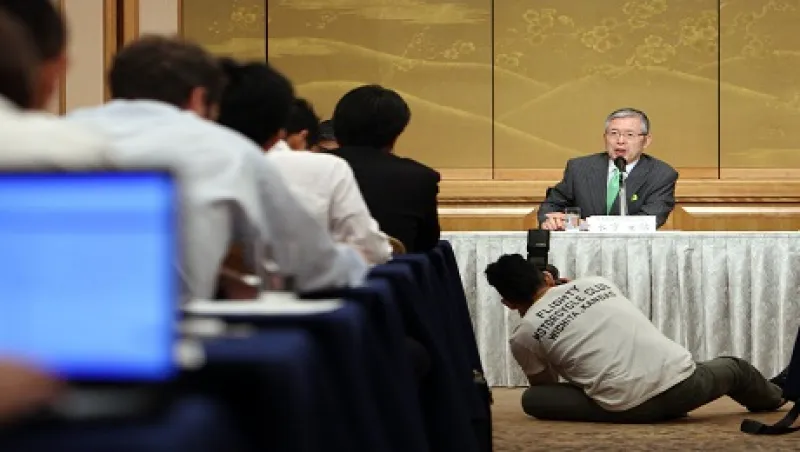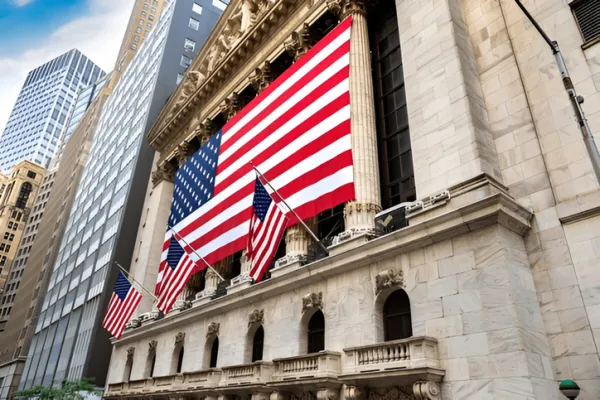| Related Content Most Honored Companies Best IR Companies Best IR Professionals Best CEO Best CFO |
Abe comes from a long line of political leaders. His grandfather Nobusuke Kishi served as prime minister in the late 1950s, and his father, Shintaro Abe, was a leading figure in the Liberal Democratic Party who held a number of ministerial posts, including head of International Trade and Industry and Foreign Affairs, in the 1980s.
Shinzo Abe has not only continued in that tradition, he has revitalized politics in Japan. Since leading the LDP to victory in the December elections and returning to the prime minister’s office he held briefly in 2006–’07, Abe has jolted Japan out of its long political torpor and showed that policy does matter. He began to set change in motion one month before the election, when he made a bold promise to reflate the economy and push the Bank of Japan to ease monetary policy. Stock prices immediately took off on a massive rally, and the yen entered a major decline.
In office Abe has continued to deliver. The government adopted a ¥10.3 trillion ($101 billion) fiscal stimulus plan earlier this year to revive growth. The prime minister appointed a radical new governor at the Bank of Japan, Haruhiko Kuroda, who hit the ground running by pushing through a quantitative easing program bigger than the Federal Reserve Board’s at his first meeting, in April, and doubling the central bank’s inflation target, to 2 percent. The government’s policies have generated a new climate of optimism about Japan. The economy accelerated in the first quarter of 2013, with growth running at an annual rate of 3.5 percent, up from 1.0 percent in the previous quarter. Foreign investors have piled into the Tokyo Stock Exchange, hoping to benefit from a major rerating of Japanese stocks. Notwithstanding a sharp, 1,143-point sell-off on May 23, the Nikkei 225 index of leading stocks had by that point gained 67.2 percent since the rally began in November.
That optimism is beginning to infect Japan’s corporate leaders — a crucial factor considering that the new policies must spur corporate investment and expansion if they are to succeed in fostering a sustainable economic turnaround.
“Abenomics has put Japan back at the center of the world,” says Carlos Ghosn, chief executive officer of Nissan Motor Co., the country’s second-largest automaker. “We hope this focus on the economy and on the revival of Japan will continue.”
Responding by e-mail to questions from Institutional Investor, Ghosn explains that Nissan had been urging the government “to remove the headwind of exchange rates since 2008. Five years later it is happening. So we applaud and we recognize the fact that something has been done.” The new easy-money policies and the government’s apparent support for a weaker yen have caused the currency to drop by 16.7 percent since mid-November, to 102.84 to the dollar late last month.
The French auto executive (Nissan is 43 percent owned by Renault, of which Ghosn is chairman and CEO) believes the reflationary policies will continue to stimulate Japan Inc. “In my opinion it’s not finished,” he writes. “Companies are starting to build up more production. People are starting to reinvest again. The stock market is up. Foreign companies are more interested in Japan.”
Ghosn’s views carry great weight in Japan given his prominence as an executive who helped rescue Nissan from steep losses at the end of the 1990s and return it to profitability over the past decade. Investors and analysts welcome his leadership and performance. Ghosn is voted the best CEO in the Autos sector by the buy-side and sell-side analysts who chose the 2013 All-Japan Executive Team, II ’s inaugural ranking of the top chief executives, chief financial officers, investor relations professionals and IR teams.
The company with the No. 1 management overall is Nidec Corp., a maker of small precision motors for computer equipment, appliances and autos. CEO Shigenobu Nagamori is cited as the best chief executive in the Electronics/Components sector by both buy-side and sell-side analysts. Masuo Yoshimatsu wins similar recognition as the sector’s best CFO, and buy-side analysts rate Nidec’s Investor Relations team and its chief, Masahiro Nagayasu, as No. 1 in the sector. Those scores make Nidec the Most Honored Company in Japan, according to the ranking.
Auto-parts manufacturer Denso Corp. and giant lender Mizuho Financial Group rank just behind Nidec on the Most Honored list, followed by Nissan Motor, telecommunications operator KDDI Corp. and drug company Astellas Pharma.
The All-Japan Executive Team is based on the votes of 387 buy-side analysts at 223 investment firms and 245 sell-side analysts at 25 firms.
Japanese companies have struggled with deflation and a low-growth economy for years while rivals such as China and South Korea have expanded; the country’s consumer electronics industry has lost market share to the likes of Apple and Samsung Electronics Co.
Corporate Japan will consider the new government successful if it can end the psychology of deflation and stagnation and offer the prospect of renewed growth. So far, business leaders are fairly optimistic.
“Abe-san has already achieved a lot,” Nidec’s Nagamori says in an interview at the company’s headquarters, outside Kyoto in western Japan. In particular, he cites the reversal of the yen after years of punishing strength that made companies increasingly uncompetitive against South Korean rivals. “I believe now Japanese companies are coming back to a level playing field,” he says.
Going forward, much depends on the LDP’s ability to win the July elections for the upper house of Parliament, Nagamori says. “Until the elections have been held and are seen to have resulted in an endorsement of Abe’s leadership — notably on the yen but also in fiscal policy — the prime minister basically has to keep his head down,” the CEO says.
Abe needs a solid majority in the upper house to enact growth-enhancing structural reforms, which he calls the third arrow in his policy quiver after fiscal and monetary stimulus. In a speech last month, the prime minister said the reforms would include deregulation measures aimed at boosting private investment to ¥70 trillion a year, the level that prevailed before the financial crisis.
Investment does appear to be picking up. According to the Bank of Japan, new loans for fixed investment rose 7.1 percent in the first quarter of 2013, to ¥12.1 trillion.
Corporate profits are also on the rise. By May 17 some 376 companies, or 22 percent of the total traded on the Tokyo Stock Exchange, had released their annual reports. They showed an average profit rise of about 30 percent. Many analysts are forecasting a further increase of about 50 percent in the current financial year, ending March 31, 2014; this would roughly restore profits to their precrisis level. Even that projection may understate the potential.
Jesper Koll, director of Japan equity research at J.P. Morgan in Tokyo, predicts that corporate earnings will jump by 58 percent this year. “Japan Inc. is now in a sweet spot where the dramatic cost cuts and restructuring that were implemented after Fukushima and the Thai floods yield the first concrete benefits,” he says, referring to the tsunami that caused a meltdown at Japan’s Fukushima Daiichi nuclear plant in March 2011 and the floods that disrupted production in Thailand later that year. In the financial year just ended, Japanese companies have reported sales gains of about 3 percent and earnings gains of about 20 percent, Koll says. By comparison, these companies have typically needed 5 percent sales growth to generate earnings gains of 10 percent.
“Efficiency and margins have almost doubled,” Koll says. “This is not about Abenomics; windfall gains from a weaker yen are negligible so far. That’ll be a turbocharge to earnings going forward, particularly since giants like Toyota and Hitachi are budgeting for a ¥90-dollar rate” for the current year.
Will Abenomics work? Jun Konomi, COO of Asia-Pacific equity research at Nomura Securities, says the aggressive fiscal and monetary policies adopted by Abe and Kuroda have created the right framework. “The macro economy is in fine shape, and the central bank will definitely take the measures necessary to let inflation rise to a 2 percent per annum level,” he says. The micro economy, however, will take more time, Konomi adds. Even if the LDP secures a victory in the upper-house elections this summer, it will take time to put in place structural reforms considering the likely opposition from entrenched interest groups, such as Japan’s agricultural lobby.
Abe is reaching out to the business community to help push his agenda. The prime minister tapped Takeshi Niinami, CEO of convenience store chain Lawson, to take a seat on the new Industrial Competitiveness Council, led by Heizo Takenaka, a prominent reformer who helped resolve Japan’s banking crisis a decade ago. The council was created to advise the government on structural reforms. Both buy-side and sell-side analysts voted Niinami the No. 2 CEO in Retailing, and Lawson ties for 16th place on the list of Japan’s Most Honored Companies.
“As an Abe believer I am convinced that a result can be obtained on the deregulation front,” says Nomura’s Konomi.
Nidec’s Nagamori hopes the government will make corporate tax reform a part of its program. Japan’s current corporate rate of 40 percent stands far above those of regional competitors such as China, South Korea and Taiwan, where rates range from 17 to 25 percent. “That is not acceptable,” Nagamori says of the stark difference in tax rates.
The prospects for significant tax relief don’t seem very bright, however, in light of the government’s big deficit and debt. Abe has pushed for tax breaks for companies that hire or invest in energy-saving buildings, but he has not called for a reduction in the basic corporate income tax rate.
For many other challenges, companies can’t look to Abenomics for the solution. Consider Nidec. Nagamori founded the company 40 years ago and developed it into a specialist producer of small motors for hard-disk drives and other electronic devices. The business was lucrative as Nidec built a global market share of 70 to 80 percent for motors used in personal computers and digital cameras, but recent changes in the industry — the decline of PC sales as tablets grow in popularity and the eclipse of digital cameras by smartphones — have buffeted the company.
Now Nagamori is trying to reorient Nidec to supply other sectors, especially the automotive industry, which puts more and more electronic devices into today’s vehicles. “Cars are what it’s all about in our markets,” he says. Nidec took a write-off of ¥40 billion in the quarter ended March 31 to cover the restructuring of the business, causing the company to post its first-ever quarterly loss. For the full year net income plunged 80 percent, to ¥8 billion, but sales gained 3.9 percent, to ¥709.3 billion.
The currency depreciation of the past seven months will give Nidec a significant boost if it’s sustained. “If the U.S. dollar stays above ¥100, our sales will be up by ¥100 billion from our original guidance of ¥800 billion to ¥900 billion,” says Nagamori.
The CEO is counting on diversification to produce longer-lasting benefits. Nidec has taken advantage of the strong yen to go on an acquisition spree. The company spent ¥79.9 billion in the 2012 financial year to buy six overseas companies: three in the U.S. and one each in Europe, China and South Korea. Those companies produce motors for the automotive, appliance and industrial sectors — all areas in which Nidec is seeking to expand. Nagamori believes the deals will strengthen his company for the long run. They are also making Nidec less Japanese, an inevitable result of competing in a global business but one that suggests a challenge for the Abe government as it tries to revive the domestic economy.
“Nidec is becoming a true global company, holding offices in 33 countries worldwide with 160,000 employees, where only 15,000 are Japanese,” Nagamori says. “My plan is to have presence in 50 countries by 2020.”
Nissan, like other Japanese automakers, has moved a lot of its production offshore in response to the yen’s strength in recent years and to meet rising demand in countries like China, now the company’s biggest single market.
Yet exchange rates still have a big impact. The company’s net income was flat last year at ¥342.4 billion, and a modest weakening of the yen helped prevent a decline. The Japanese currency’s fall to an average of 82.9 to the dollar last year from 79.1 a year earlier boosted Nissan’s operating profits by ¥30.2 billion, or a little more than 5 percent. The company forecasts a ¥225 billion currency gain this year, based on a projected average rate of ¥95 to the dollar. It’s not hard to see why Ghosn has been urging the government to let the currency decline.
Nissan also is working to overhaul its product lineup to drive growth. Although the company boosted unit sales last year by 1.4 percent, to 4.9 million vehicles, sales declined in China and Europe, and the company lost a half point of market share, to 7.7 percent, in the U.S. The automaker plans to launch three new models in China this year and four in the U.S., including a redesigned Altima, its flagship midsize sedan.
Many analysts are focusing on Ghosn’s big bet on electric vehicles. Nissan introduced the all-electric Leaf with fanfare in 2010, but sales — a cumulative 62,000 through the end of March — have fallen short of the company’s targets.
Ghosn acknowledges that electric-vehicle sales have been slow to take off, but he is sticking with his forecast that the global market will grow to 1.5 million units by 2016 as more countries develop networks of charging stations. “Many governments are taking very seriously the infrastructure issue,” he says.
The CEO remains confident that Nissan will grab a sizable share of the electric-car market. “For the past few months, we are seeing an acceleration of the sales of the Leaf,” he says. “The word of mouth is that this is a good car, and charging the Leaf is not such a problem if you know where to do it.” Such optimism is in greater supply these days in Japan. The reflation policies of the Abe government have lifted a veil of gloom from the corporate sector and provided the best prospect for growth that the country has had in years. But Japan’s top executives know it is up to them to capitalize on this opportunity.
“If the current condition of the yen and the Japanese economy continue, I believe Japanese corporations will show solid results in the second half of the 2013 financial year,” says Nidec’s Nagamori. “And from there real competition among companies will start.” • •






